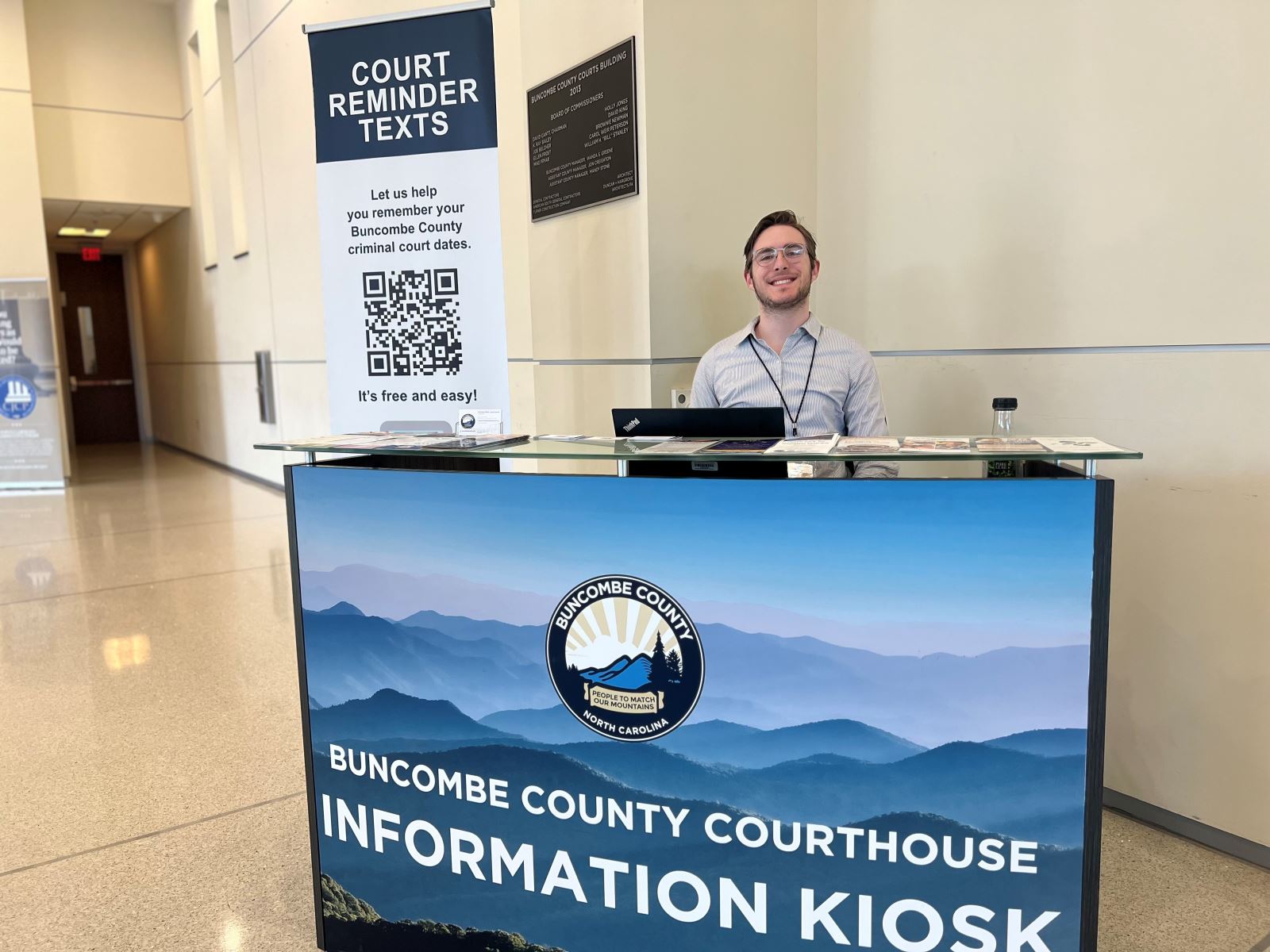
Thanks to Eric Jackson with the City of Asheville’s Office of Data & Performance for this in-depth look at the driving force behind the Buncombe County Court Reminder system. This article was originally published on LinkedIn.
If you were out driving in Buncombe County in August and September you may have seen a billboard advertising a free text reminder service for Buncombe County criminal court. The story behind that sign offers a valuable example of the way community engagement, community and intergovernmental partnerships, and data can combine to drive strategy, execution, and evaluation.
The story began back in 2018 when Buncombe County received a grant from the MacArthur Foundation to fund the Buncombe County Safety and Justice Challenge or SJC, an effort by the County, the City of Asheville, the Sheriff’s Office, and the court system to implement strategies to reduce over-incarceration by addressing the main drivers of Buncombe County’s jail population.
The focus on the underlying drivers is important. The goal is not just to get people out of jail. The goal is to prevent them from ending up there in the first place. That means that, from the beginning, our efforts have focused on using data, both local and from other jurisdictions, to identify those drivers and to discover potential sustainable solutions to address them.
Failure to Appear
One key driver that became clear early on was FTAs or “failures to appear,” people who had been released on bail but who were then re-arrested for failing to appear for a court date. Judges tend to set higher bonds after someone misses a court date once, and so people end up remaining incarcerated longer while waiting for trial.
It is important to emphasize that we are talking about people who have not yet been convicted of anything; they are legally innocent and, according to state law, can only be held if they are dangerous to the community or likely to flee in order to avoid consequences of their action. The first does not apply to most people booked into the Buncombe County jail (and when it does, the judge sets a high bond or disallows release).
For the rest, the data shows that the vast majority of people charged with a crime in Buncombe County (and elsewhere) show up for their court dates. Of those who do not, the most common reasons are forgetting, inability to arrange transportation or childcare, having to choose between court and a key life need (job or caregiving), or simply feeling intimidated. None of those qualify as “fleeing.”
There are a variety of interventions that have been tried. The only one with consistent, solid evidence of success across many jurisdictions is a reminder system just like the ones you probably get from your doctor or dentist (who also have significant problems with FTAs but aren’t allowed to have people arrested for it).
So, the evidence tells us that FTAs are a big problem and also that the best way to address it is to remind people by sending them text messages. The North Carolina court system does offer a text reminder system, but it turned out to be so hard for people to use that uptake was minimal. Unfortunately, when the County then proposed to build their own system, it was denied access by the state to the data feed they would need to do it.
That left things at a standstill for the first couple of years.
Enter the Community Engagement Workgroup or CEW. One of several teams operating as part of the SJC (and the one I have served on as City liaison since 2020), the group works to ensure that community perspectives and needs, particularly of those most directly impacted by the system, are represented in the solutions being implemented. We accomplish this through regular engagement with the community with surveys and listening sessions and by having community members serve as members of the workgroup.
The CEW kept the focus on the reminder system as a place where the interests of the grant effort, the court system, and the community align and continued to look for a solution. We engaged with a local civic tech volunteer group called Code with Asheville to develop an easier-to-use system. The result, the Buncombe County Court Reminders system, officially launched in November 2021.
The system is designed to be extremely easy to use – an individual must put in their name, pick the right match, and enter a phone number to sign up. The system is by-name, which means that users don’t need to know all their case numbers as with the state system, and it automatically updates court dates weekly to catch any changes or new charges.
The reminders themselves are designed in accordance with studies showing that the most effective messaging strategy is to mix warnings about consequences with suggestions for preparation. Thus, subscribers receive a message one week in advance warning them that they can be arrested if they don’t appear and a second two days in advance reminding them to arrange for transportation or childcare.
The new site was actively promoted in the courthouse through signs and occasional announcements in court. Signups initially surged, but then fell to around a dozen or so a month through 2022. Not enough to make a significant impact on FTAs. Something more was needed.

The Court Navigator helps court visitors sign up for text notifications.
We decided that the biggest opportunity for impact was to offer people the chance to sign up when they are booked into the jail. With the help of Hector Salgado of the Buncombe County Equity and Human Rights Office, we succeeded in getting this integrated into the process. People indicate interest during booking, then County staff sign them up once they are actually released.
That system launched in January of this year. Every month since then has averaged over 200 signups, and analysis by the County shows that the demographics of signups match the demographics of those being booked into jail. Success!
But of course, it’s not the signups that matter, but whether they reduce the number of FTAs. We don’t have that answer yet - we needed to wait a few months so that people had a chance to have court dates. Lee Crayton of the Buncombe County Strategy and Innovation Department is beginning that analysis now for the people that the County signed up.
My hope is that we will see a positive impact. If we don’t, we will obviously investigate both through interviews with folks who got reminders but still failed to appear and potentially by experimenting further with the number and types of reminders sent out.
We’ll also be using signup data to explore the impact of this month’s communications push through billboards and other media, and we’ll be exploring other ways to connect people who are not booked into the jail to the service. And of course, we continue to explore other approaches as well.
Data will continue to be a critical component: helping us identify the problems to be solved, guiding us to potential solutions and how they might best be implemented, and supporting us in evaluating how well those solutions work and what to try next if they don’t.
But all the data in the world won’t make those solutions actually happen - that takes people. I am grateful for the ways that people from across the system have worked together to advocate for and implement this system, from District Attorneys to public defenders, from jail staff to judges, from courtroom deputies to all the folks in Justice Services. And I am particularly grateful for all the people from the community who step up to offer their time and their expertise to bring good ideas to reality.